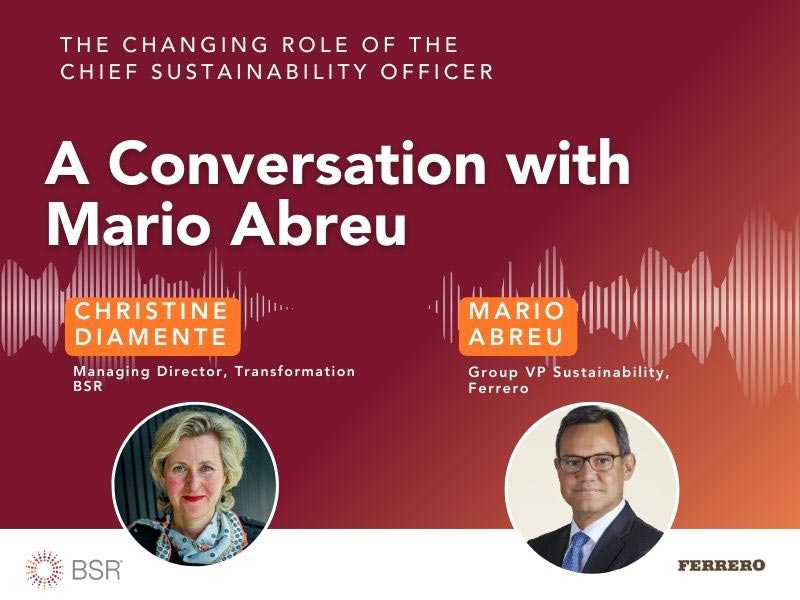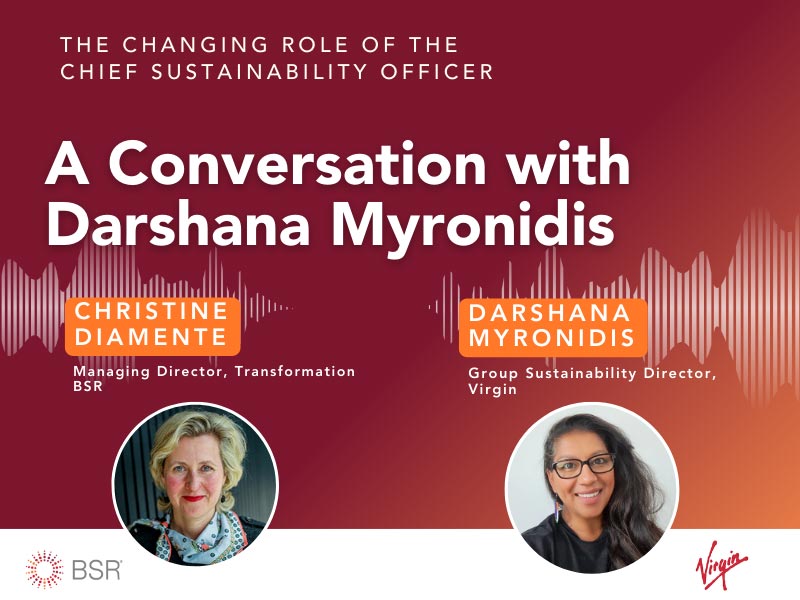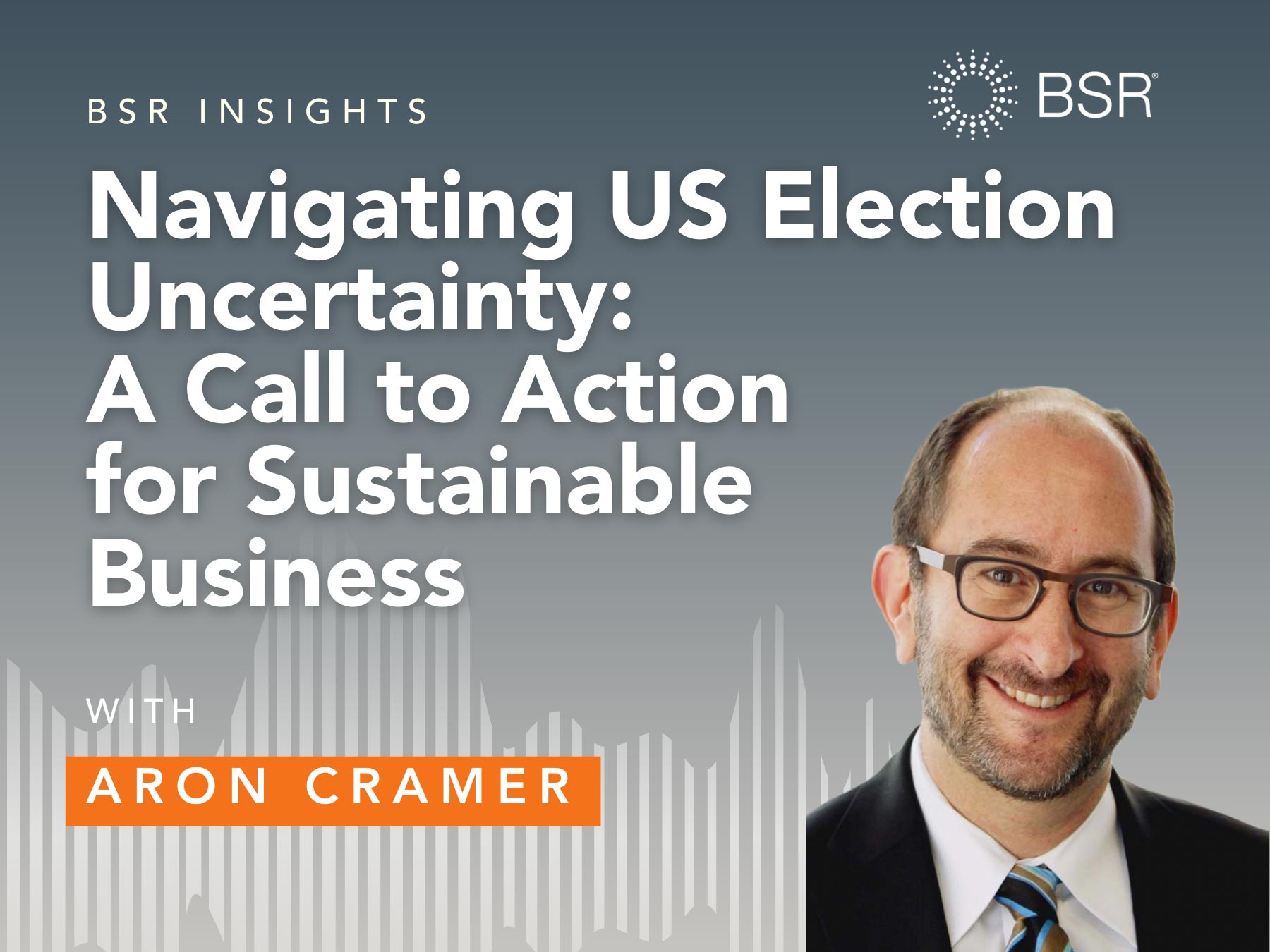
Photo by Patrick C. Freyer
Authors
-
Charlotte Bancilhon
Former Director, Sustainability Management, BSR
In April, the European Financial Reporting Advisory Group (EFRAG) released a set of sector-agnostic exposure drafts that form the first set of European Sustainability Reporting Standards (ESRS). These standards will become mandatory under the Corporate Sustainability Reporting Directive (CSRD) and will have a significant impact on companies doing business in the EU.
This is one of several major milestones toward the standardization of sustainability reporting on a global scale. This spring, the US Securities and Exchange Commission (SEC) and the International Financial Reporting Standards Foundation (IFRS) individually released exposure drafts for sustainability-related disclosures.
These public consultations are a unique opportunity to influence the future of mandatory sustainability reporting standards and build a sustainability reporting system designed to enhance both business and sustainability performance.
BSR commends EFRAG for its leadership and efforts in creating the sector-agnostic standards.
Below, we summarize our response to EFRAG’s public consultation which is informed by 30 years of hands-on experience implementing best practices with member companies. BSR’s comments are made in the service of reporting standards, designed to support improved sustainability performance by companies and the achievement of EU sustainability policy objectives.
Granularity of Disclosure Requirements
The disclosure requirements outlined in the exposure drafts demand a level of detail and specificity that goes beyond standard reporting practices—even those of the most advanced reporters. While BSR believes that comparable disclosures require ambitious, specific, and prescriptive reporting standards, we question whether all the elements of each disclosure are decision-useful for stakeholders. We support the disclosure requirements to the extent that compliance with them does not (1) overshadow the most decision-useful information and (2) divert resources away from sustainability performance improvement.
Alignment with Other Standards
We encourage EFRAG to further align disclosure requirements with established standards (such as the Global Reporting Initiative, or GRI) and emerging reporting standards (such as the SEC’s draft climate rule and IFRS Standards). We believe that harmonization is fundamentally important to creating a system that maximizes impact and achieves efficiency and comparability. Even minor differences in language between different reporting standards present the risk that companies will spend time and resources developing separate disclosures concerning the same topics but for different jurisdictions, which would make reports less useful for readers. BSR proposes that EFRAG map the final standards against GRI and International Sustainability Standards Board (ISSB) Standards and cross-label or explicitly reference them as appropriate.
Double Materiality
BSR fully endorses the concept of double materiality. However, we believe that the proposed definition of impact materiality is too broad and lacks the concept of prioritization. Similarly, we encourage EFRAG, the ISSB, and the SEC to align their definitions of financial materiality. Multiple definitions will make it difficult for companies to report across jurisdictions. BSR supports a definition of financial materiality that is consistent, interoperable, and substitutable.
Rebuttable Presumption
BSR does not support EFRAG’s proposal for the rebuttable presumption. We believe it will be difficult and resource-intensive for companies to prove a topic is not material based on “reasonable and supportable evidence,” adding an unnecessary layer of complexity and leading to less concise, less focused, and less decision-useful reporting.
Architecture and Presentation
The standards can be streamlined to avoid duplication and make them easier to understand and navigate for report preparers and users.
Boundaries, Restatements, and Value Chain
BSR agrees that the boundary for the sustainability statement should mirror that of financial reporting and extend to the company's upstream and downstream value chain. While the draft standards request estimates when the full boundary cannot be measured, we believe overusing estimates could be misleading and unhelpful.
Estimates
BSR believes that the current exposure drafts rely too heavily on the use of estimates when data are not available or difficult to collect. We believe that EFRAG should propose a “comply or explain approach” via omissions for disclosures beyond a core set, in line with the approach of the GRI Standards.
Targets
According to ESRS 1, if there are no targets in place, the company needs to provide valid reasons. We believe this sets an unreasonable expectation that companies should be setting measurable outcome-based targets across all risks, opportunities, and impacts. There is a possibility that this will result in companies establishing targets across several topics where targets may not be relevant, meaningful, or useful.
Format of Statements
BSR believes that the standards should allow more flexibility in referencing disclosures inside the management report. This would improve overall usability and avoid duplication within the management report when information is provided in other sections.
Feasibility
BSR recommends identifying additional disclosures as optional or considering phasing in certain topic-specific standards or disclosure requirements (e.g., biodiversity disclosures). In many cases, protocols for reporting on such topics are immature, which risks mandating the disclosure of information that may be less than fully accurate.
Use of Entity-Specific Disclosures
It is unclear whether the ESRS suggests completely phasing out entity-specific disclosures over time as sector-specific standards are created. BSR feels that companies should be allowed to continue to disclose entity-specific information as they deem it relevant and appropriate.
We believe that these exposure drafts are an important first step toward achieving our common goal of improved company disclosure and sustainable outcomes for all. BSR will continue to engage in the development of reporting standards, and in ESG reporting more broadly, through our Future of Reporting collaborative initiative.
We encourage companies to participate in the consultation process and share their perspective on how to maximize the efficiency, effectiveness, and impact of reporting in support of resilient business and a more just and sustainable world.
Topics
Collaborative Initiatives
Let’s talk about how BSR can help you to transform your business and achieve your sustainability goals.







